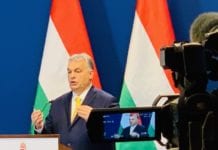(ADDS MORE BACKGROUND, REACTIONS).
By BosNewsLife News Center

PRAGUE/BUDAPEST (BosNewsLife)– Former Czech president and dissident playwrite Vaclav Havel has died at the age of 75, officials said.
“He passed away in his sleep at his beloved country house…in northern Bohemia, tended to by his wife Dagmar,” Radio Prague reported on its website, citing his personal assistant.
The Czech Republic soon began mourning a man who became known around the world for his fight for freedom and human rights, including persecuted Christians and political activists in his own country and nations such as Cuba and China.
Vaclav Havel was his country’s first democratically elected president after the non-violent “Velvet Revolution” that ended four decades of repression.
As president, he oversaw Czechoslovakia’s transition to democracy and the free-market economy, as well as its peaceful break up. In 1993 the countries Czech Republic and Slovakia emerged.
Havel said at the time he deeply regretted the break up. But he was proud to have overseen as president the dissolution of the Warsaw Pact – the Moscow-led military alliance that lasted until 1991.
“BOURGEOIS CAPITALIST”
Havel was born in Prague in 1936 to a family that owned film studios and prime real estate in the city. After the Communists took control following World War Two, he was labeled a “bourgeois capitalist” and banned from studying. Despite this setback, he would work his way up in the theater world to become a writer and director.
When the regime cracked down on the Prague Spring in 1968 he was also banned from the theater but continued writing and became more involved in the dissident movement.
His political activism began in earnest in January 1977 when he helped draw up Charter 77, a manifesto calling on the communist authorities to live up to the international commitments they had made on human rights.
His political activities resulted in multiple stays in prison, the longest being nearly five years, and also subjected him to constant government surveillance and questioning. His longest stay in prison, from June 1979 to January 1984, is documented in Letters to Olga, his late wife.
“CATAPULTED” PRESIDENT
When the wave of revolutions sweeping across central and eastern Europe in 1989 reached Czechoslovakia, Havel was, as he put it, “catapulted” into the presidency overnight, just months after being released from jail.
On December 29, 1989 he was elected Czechoslovakia’s president by the country’s still-communist parliament.
He has later credited with the Czech Republic’s entry into the NATO military allience in 1999 and was largely credited with laying the groundwork for the country’s accession into the European Union in 2004.
Havel also became a voice for the voiceless, including jailed dissidents and Christians in Cuba, China and elsewhere.
Yet, Havel’s health deteriorated in recent months, which was partly blamed on mistreatment in Communist jails and chain smoking.
LUNG, HEART PROBLEMS
The former head of state suffered from lung and heart problems, and he had to limit his public appearances. One of his last appearances in public was when he received the Dalai Lama during his Prague visit.
However his death announced Sunday, December 18, still came as a shock for Czech and international leader. In the Czech Republic Prime Minister Petr Necas told media that Havel’s passing away “was a great loss for the Czech Republic” and added that he “deserved the highest state honors.”
Former Prime Minister Milos Zeman, a Social Democrat, called Havel “a symbol of the Czech Republic who had the courage to stand up against the Communist regime” when “many others lacked” it.
Radio Prague quoted Finance Minister Miroslav Kalousek as saying that Havel “did a lot during the country’s accession” to the European Union and NATO military alliance.
INTERNATIONAL REACTIONS
In Germany, meanwhile, Chancellor Angela Merkel said Havel would be remembered as “a great European” for his efforts to promote human rights and democracy.
Former United States Secretary of State Madaleine Albright, who was born in was was Czechoslovakia, said Havel made his nation and many people around the world proud.
Slovak Prime Minister Iveta Radicova stressed that Havel “opened the doors to the world for Czechoslovakia, enabling the return of democracy to central Europe,” Radio Prague reported.
In a statement, the president of the European Parliament, Jerzy Buzek, stressed that Vaclav Havel was and would remain a hero.
Sweden’s Foreign Minister Carl Bild reportedly called Havel “one of the greatest Europeans of our age” whose “voice paved the way for a Europe whole and free.”








